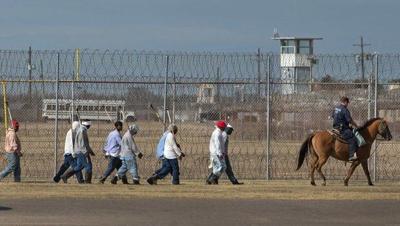A panel of appellate judges listened to arguments Monday challenging the injunction a federal district judge imposed earlier this year to improve heat protections on the “Farm Line” at Louisiana State Penitentiary at Angola.
After listening to days of testimony earlier this year, U.S. District Judge Brian Jackson issued a May 23 order that directed prison officials to lower the “heat alert” threshold that triggers precautions for men working in the prison’s fields. The ruling came with a 90-day temporary restraining order that mandated heat alerts when the heat index at the prison met or exceeded 88 degrees — 3 degrees cooler than what had been the prison’s threshold.
Judge Jackson also required prison staff to check the heat index on Angola’s farm line every 30 minutes, as opposed to once an hour, to ensure that temperatures had not reached dangerous levels.
The Louisiana Department of Public Safety and Corrections appealed the order, arguing it was not narrowly defined and didn’t address a necessary need for relief in a way that was least intrusive to prison officials. Those are parameters in the Prison Litigation Reform Act, a federal law that imposes requirements for prisoner condition lawsuits.
In its filings for a reversal, the Attorney General’s Office described Jackson’s directive to check heat index at 30-minute intervals as “micromanagement” and said his decision doesn’t comport with the PLRA, calling it overly broad.
“The May 23 order quite literally is a matter of degrees and minutes — simply because the district court disagrees with where Louisiana prison officials drew certain lines,” the argument stated, citing a 2020 opinion from the Fifth Circuit. “But the Constitution charges federal judges with deciding cases and controversies, not with running state prisons … The district court’s attempted control of LSP’s Farm Line — down to the degree and minute — fundamentally violates that principle.”
Voice of the Experienced, a reform group that represents people who were formerly incarcerated, filed the lawsuit in May 2023, alleging work conditions on the Farm Line during extreme heat violate Eighth Amendment constitutional protections that prohibit “cruel and unusual punishment” of prisoners.
Attorneys for the two sides argued before U.S. Court of Appeals for the Fifth Circuit judges Carl Stewart, Edith Brown Clement, Cory Wilson during a hearing Monday in New Orleans.
Inmates assigned to work on Angola’s so-called Farm Line plant and cultivate produce for the prison population. They put in intensive hours of labor on the prison’s sprawling fields, and VOTE claims Angola’s policies pose a substantial risk of heat-related injury for workers toiling in Louisiana’s sweltering summertime humidity.
Jackson’s ruling earlier this year was the second time he had issued an injunction in the case that imposed more heat protections for inmates. In July 2024, he ordered prison officials to address problems with lack of shade, availability of sunscreen and heat relief on the Farm Line.
Three months after that preliminary injunction expired last year, Department of Corrections officials altered the prison’s heat pathology policy. Heat alerts trigger protective measures, such as bringing heat-sensitive workers inside, and offering other workers scheduled rest breaks in shaded areas to offset when the heat index reaches dangerous levels. The heat index trigger was 88 degrees until Angola approved policy revisions in October 2024 and April that raised the threshold index for heat alerts to 91.
Jackson in May ordered Angola to return the trigger point to 88 degrees.
Appellate judge Wilson questioned Solicitor General Jorge Benjamin Aguinaga about the prison’s policy shift during Monday’s hearing.
“What the district court does here is hone in on the state’s decision to raise the threshold by 3 degrees. It doesn’t seem like we’re starting from ground zero,” he said. “So does the district court, then, need to go through the incantation from the PRLA every order it enters after the first one?”
Aguinaga cited an October 2024 ruling the Fifth Circuit made affirming unconstitutional conditions at the Raymond Detention Center in Hinds County, Mississippi. The appeals court upheld a federal consent decree and the appointment of a receiver to oversee that the jail remains compliant with the consent order. But the review panel struck down portions of an injunction as overly broad. Aguinaga argued Judge Jackson’s order cited no provisions of the PLR, and federal law required he outline specific requirements for his findings before granting “any entry of prospective relief” such as the injunction.
Anna Stapleton, a San Francisco attorney arguing as part of VOTE’s legal team, countered that Judge Jackson’s order crafted relief for the Farm Line workers that was “narrow, necessary and nonintrusive” as required by law. She noted 88 degrees is the scientifically established threshold for heat protections.
“This court has previously acknowledged that exposure to extreme heat on LSP’s farm line likely poses a substantial risk of serious harm," Stapleton said. "The appellants cannot contest that they are well-aware of that risk, yet the heat-protective policies implemented since the outset of this litigation are inadequate to protect the health and lives of men required to labor on the Farm Line.”
The appeals panel did not make a decision after listening to Monday’s arguments from attorneys. The preliminary injunction that Judge Jackson issued expires Aug. 21. State attorneys pushed to have a decision from the circuit before that expiration date so the court can weigh in before its appeal possibly becomes moot.


